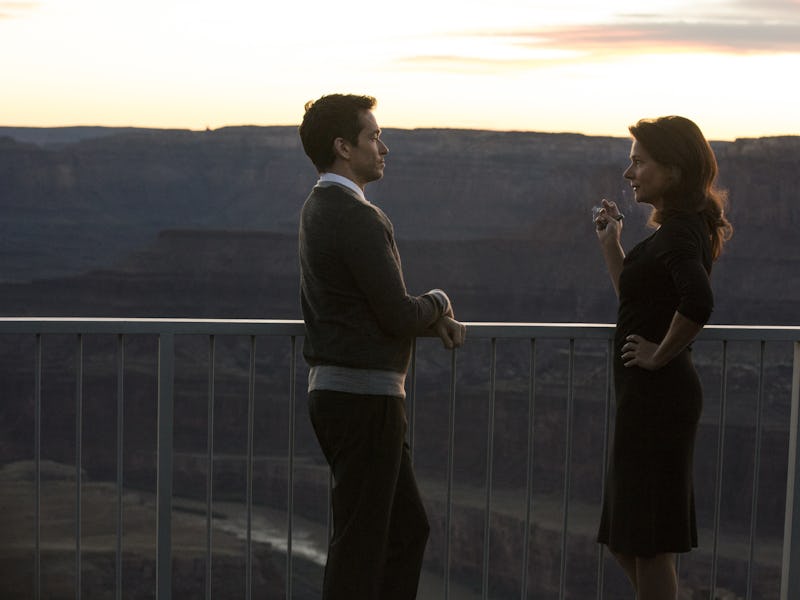The Dickish British Guy in 'Westworld' Is the Typical Peak TV Exec
Why HBO's 'Westworld' just became the most meta show on television.

The British writer in Westworld who comes up with the robot “storylines” is almost comically douchey. In the show’s pilot, Lee (Simon Quarterman) is smugly crowing about a saloon-robbing scene he wrote that concludes with an epic speech from robotic robber Hector (Rodrigo Santoro). The episode’s biggest laugh comes when a park guest shoots Hector point-blank before he can get to his scripted speech, much to Lee’s dismay.
And in the second episode “Chestnut,” Lee gleefully posits a new scenario filled with such over-the-top violence — a “savage” tribe park of robots that indulge in self-cannibalism, because it’s what the people want! — that it seems like a clear wink to another HBO show. Or rather, at least the world’s perception of the kinds of conversations that Game of Thrones showrunners David Benioff and D.B. Weiss have behind closed doors.
Westworld is many things, including a meditation on the nature of artificial intelligence and a critique of romanticizing the Old West. With its constant side cuts to park workers crafting the robots’ “stories” and worrying about what will appeal to their guests, it’s also the most meta show on TV.
In many ways, the show depicts an extended conversation about television writers and their relationships to what the “guests” (or the audience) and “management” (the network) wants. “Chestnut” made it clear the show intends to use this to slyly acknowledge not only its fellow shows, but what audiences are willing to believe about them.
Now, to be clear, Game of Thrones is not free of faults. It’s indeed crossed the line a time … or five. Oberyn needed to die, but his brains did not need to explode quite so graphically. Season 4’s House of Rape at Craster’s Keep was controversial, to say the least, and viscerally unpleasant to watch — as was the way the writers seemed to revel in putting Ramsay’s cruelties on display far more than was necessary.
Because of this, it’s natural to assume David Benioff and D.B. Weiss are rubbing their hands together and gleefully concocting the next depraved scenario, just as Simon Quarterman’s character Lee is on Westworld.
Anthony Hopkins and Simon Quarterman in "Westworld"
But in reality, Benioff and Weiss are two regular dudes who are far more in the Matt Damon and Ben Affleck mold than Bond-villain types, with Dartmouth-grad Benioff as the Damon and the Mastodon-shirt wearing Weiss as the Affleck. Game of Thrones once had too much rape not because they are secret sadists who are pro-rape but rather because there weren’t enough women in the writer’s room. It took them a while to catch up to a cultural conversation their male privilege had previously shielded them from thinking about. After several episodes of internet backlash, they eventually caught on.
But, it’s easy for audiences to assume they are sitting on couches filled with money saying, “Ok, so we’ve already exploded heads and made human dog food, what’s next? I know, self-cannibalizing! That’s what audiences want, brah!” And the Westworld writers are aware of this.
It’s telling that Westworld’s Lee is less believable than the robots; he’s practically a cartoon. As a character, he’s the walking embodiment not of what showrunners and network execs are, but of what the public thinks they are.
Towards the end of “Chestnut,” Lee presents his ridiculous, gory, lurid “storyline” to his boss, explaining that encountering a self-cannibalizing tribe is what the park guests want. “It’s who they are,” he proclaims with gusto.
“The only thing this tells me is who you are,” a gloriously sneering Anthony Hopkins tells him, refuting the idea. With that line, Westworld just asserted its dominance in the realm of meta television.
In its douchiest, dumbest character, Westworld is proving how smart it is.